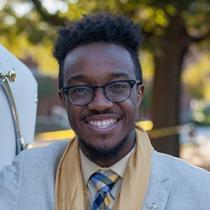
Henderson Johnson II
What is your next adventure? I am going to begin my doctoral program in aerospace engineering at Tech, studying under Dr. Lieuwen in the combustion lab. I haven't decided yet what area I will focus on, but, because I am fully funded through an NSF grant, I will be able to choose something that really interest me.
What are you most looking forward to in your next adventure? I am really looking forward to having the opportunity to gain some depth of understanding about something I'm genuinely interested in. In essence, I'm getting paid to learn, and that's incredible. I'm also looking forward to 'prepping for real-life.' I mean, in graduate school, there's no meal plan, no dorm, no one telling you what the next step is.
Did you have any previous co-op, internship, or research experience in this area that prepared you? I have done three internships, all with Boeing. The first one - in Everett, Washington - focused on service engineering -- helping operators anticipate when a plane might need servicing. The second and third ones were in Houston. I worked on the SLS [space launch system], determining the effective moment of inertia for the liquid oxygen. And I also worked on the ISS International, designing passive thermal control systems. Research-wise, I emailed Dr. Walker my freshman year, to see what I could do. He said I didn't have enough to join in the research, but I was welcome to attend the lab meetings and watch what they were doing in the lab. So that's what I did. And then I joined the combustion lab, where I've been for the last 2 years.
What about your educational experience at GT-AE helped you to achieve your goals? The biggest thing that helped me was standing up again and again when you've been knocked down for the 45th time. AE is the hardest major. You have to learn a little bit of everything - chemistry, circuitry, physics,everything - and you have to pull it all together to make any sense of this major. It can be overwhelming, but failing -- when you go somewhere and create something that goes up in flames -- that's worse. It's a high-stakes game. So getting knocked down here was a test, to understand what I got wrong and to get ready for the next challenge. You fight to get into Tech- because it's hard to get in - and you fight to get out, to graduate - because that's how you prove you are ready for the world. And let me say, too: it was very meaningful to me to have a black professor - Dr. Walker - who was terrific in every way, who really puts in the effort. Seeing him and his success was extremely important to me
What advice would you give someone who wanted to follow in your path? A few things. First, find what you are passionate about and stick to it. Secondly, learn to teach yourself. You are your own best teacher. This will help you a lot when you don't get something and there's no one around. If you can get a cursory understanding of some basic concepts, keep working it until you get the whole thing. I did this, and it helped build me up. Thirdly: don't get stuck in the AE school. Get out and experience this entire campus. There are more than 400 student organizations at Tech, and they are not all in AE. And lastly: don't give up. I'll say it again: AE is hard. But what you do to succeed is also important. AE is about taking people higher, faster, breaking boundaries. None of that is easy. Recognize that and do it anyway. They wouldn't have admitted you to the school if they didn't think you could do it.